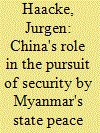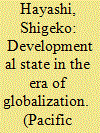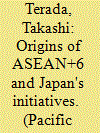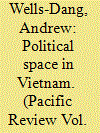|
|
|
Sort Order |
|
|
|
Items / Page
|
|
|
|
|
|
|
| Srl | Item |
| 1 |
ID:
094444


|
|
|
|
|
| Publication |
2010.
|
| Summary/Abstract |
Since normalising diplomatic relations in 1972, successive Australian and Chinese governments have focused on deepening trade and investment links to such an extent that China now looms as one of the most critical countries on Australia's twenty-first century horizon. For their part, Chinese elites have welcomed closer ties with Australia and have been particularly keen to accelerate China's direct investment in the Australian mining and energy sectors. Since the early 2000s, a number of commentators have argued that Australia has been gradually drifting towards China's sphere of influence in the Asia-Pacific. This trend, they argue, has been reinforced following the election in 2007 of the Labor party government, which has terminated Australia's involvement in quadrilateral talks with the US, India, and Japan; stepped back from commitments to export uranium to China's long-standing rival, India; and intensified Australia's public criticism of Japanese whaling practices. Meanwhile, in 2008, Prime Minister Kevin Rudd made a point of paying a high profile visit to China during his first major overseas journey, but not matching it with a visit to Japan. Is Australia drifting towards China's strategic orbit in Asia? The article examines this question through the prism of three key indicators of realignment and concludes that, while there is some evidence of Australia accommodating Chinese strategic preferences in Asia, there is no indication that it is realigning itself strategically towards China and away from its long-standing ally, the US.
|
|
|
|
|
|
|
|
|
|
|
|
|
|
|
|
| 2 |
ID:
094448


|
|
|
|
|
| Publication |
2010.
|
| Summary/Abstract |
This article focuses on both the opportunities and challenges that the People's Republic of China (PRC) presents for Myanmar's State Peace and Development Council (SPDC) in its quest for security. It does so in the context of significant external pressures on the military regime and its ongoing struggle to consolidate the state. The article argues that though Myanmar's military has successfully relied on Beijing for economic development as well as diplomatic protection against efforts to take the junta to task for its political intransigence in the face of Western demands for a more inclusive political process towards national reconciliation, Beijing's political support is actually more ambiguous than first meets the eye. It also suggests that China's links to the areas in which ethnic armed ceasefire groups formerly making up the Communist Party of Burma exercise significant if not complete authority have complicated efforts by Naypyidaw to impose its perspective on state and nation building along at least part of the Sino-Myanmar border. Rising frustration with perceived Chinese involvement and influence as well as strategic calculations about how to exploit potential opportunities have led the SPDC - in the run-up to the 2010 elections - to explore the possibility of improved relations with Washington and to use force in Kokang despite the risks such a move entails.
|
|
|
|
|
|
|
|
|
|
|
|
|
|
|
|
| 3 |
ID:
094445


|
|
|
|
|
| Publication |
2010.
|
| Summary/Abstract |
Criticism of the developmental state can be divided into two categories. One is the neoliberal position that criticizes the efficacy of the developmental state model itself. According to this view, the developmental state was not an important factor in East Asian development and the adoption of industrial policy would in fact be detrimental to developing countries. A second critical position concedes that a degree of achievement was indeed attained by the developmental state in the past, but argues that the developmental state model is no longer a viable option today. This position holds that the high level of government intervention in successful East Asian countries more or less contributed to their economic development, but that this policy is no longer feasible. While deepening globalization in the world economy is regarded as inimical to the developmental state, some also argue that the developmental state model could only have worked during the Cold War and could not function in today's international political and economic climate. Despite these negative observations, the purpose of this article is to demonstrate the viability of the developmental state model. First, the article supports the statist position by broadening the scope of the argument: developmental states exist not only in Northeast Asia, but also in Southeast Asia, and the East Asian authoritarian regimes had a role in economic development. Second, this article directly counters new criticism of the developmental state. It argues that the developmental state model is still an effective development strategy in the post-Cold War period and even in the era of globalization: the model was useful in East Asia, and could be useful beyond East Asia.
|
|
|
|
|
|
|
|
|
|
|
|
|
|
|
|
| 4 |
ID:
094446


|
|
|
|
|
| Publication |
2010.
|
| Summary/Abstract |
The move towards ASEAN+6 began in earnest with a speech by Junichiro Koizumi in 2002, when the former prime minister called for Australia and New Zealand to be included as 'core members' in the process towards creating a community in East Asia, along with the 10 members of ASEAN and China, Korea and Japan. With the inauguration of the East Asian Summit in 2005, a tangle of regional institutions competes for attention and resources, and as long as the 16-nation ASEAN+6 framework continues to coexist with the 13-nation ASEAN+3 framework in East Asia, the argument as to which is the more effective framework for regional cooperation continues to linger. Why is Japan so interested in promoting ASEAN+6 as an 'expanded' East Asian regional concept, despite the existence of ASEAN+3?
This article has considered how changes in the US-led structure have influenced Japan as the agent in which regional integration within the ASEAN+6 framework was generated, by focusing on the process by which consideration of a countermeasure to the rise of China led Japan's Ministries - such as Ministry of Foreign Affairs and Ministry of Economy, Trade and Industry - to propose and advocate the East Asian Summit and the Comprehensive Economic Partnership in East Asia, respectively, in lines with prime ministers' policy stances. The regional structure in which China's challenging behaviour was more directly relevant, can be considered to have exerted a strong influence on the Japanese state as an agent where two rival ministries shared the concern and commonly promoted ASEAN+6 framework despite the lack of strong inter-ministerial communication. This article finally examines the more recent changes in the structure, highlighted by the US initiative in the promotion of the Free Trade Area of the Asia-Pacific and the re-emergence of ASEAN+3 triggered by China's aggressive regional financial initiatives, and asserts these events have dimmed the prospects for ASEAN+6, since these changes meant the transformation of the preconditions behind the birth of ASEAN+6 in Japan.
|
|
|
|
|
|
|
|
|
|
|
|
|
|
|
|
| 5 |
ID:
094447


|
|
|
|
|
| Publication |
2010.
|
| Summary/Abstract |
Single-party, authoritarian states such as Vietnam are frequently characterised as having 'closed' political opportunity structures and 'un-free' socio-political systems. The validity of this observation depends, however, on the viewer's frame of reference. Seen from the perspective of active citizens, Vietnamese political structures offer increasingly greater space for collective action than a state-centred institutional analysis would predict. Episodes of contentious politics surrounding land disputes and public parks during 2007 provide evidence of the changing dynamics of participation in politics. Actors involved in these and similar campaigns are broadly optimistic about the future prospects for an opening of political space within the existing system. These findings are contrasted with international reports of violations of political rights and with the Vietnamese government's own efforts at legal reform. Although signals remain mixed, to some extent Vietnam might be becoming a 'rice-roots democracy' in practice, while remaining a single-party state. The voices and experiences of civil society actors will continue to shape opportunities and risks in the expansion of political space.
|
|
|
|
|
|
|
|
|
|
|
|
|
|
|
|
| 6 |
ID:
094443


|
|
|
|
|
| Publication |
2010.
|
| Summary/Abstract |
In July 2007, Indonesia became the first country to introduce mandatory legal requirements for corporate social responsibility when the Indonesian parliament passed Law 40/2007 on Limited Liability Companies. This paper examines the political dynamics that shaped this and subsequent regulatory developments related to corporate social responsibility and assesses the likely future direction of Indonesia's corporate social responsibility policies. We argue that policy debates over corporate social responsibility in Indonesia have reflected a struggle between the dominant sections of Indonesia's capitalist class, local communities that have been negatively affected by corporate activity and their allies in the non-governmental organization movement, and predatory elements in the political parties and bureaucracy for control over the economic resources generated by the activities of major corporations in that country. We argue that the dominant sections of Indonesia's capitalist class have so far won this struggle in large part because of their instrumental connections to senior Golkar figures within the government. With respect to the future direction of corporate social responsibility policy, we argue that much will depend on the outcome of future presidential elections. If these elections produce a political leadership that supports a mandatory approach to corporate social responsibility, there is some chance that mandatory requirements for corporate social responsibility in Law 40/2007 will be implemented. If they result in the election of a leadership that does not support a mandatory approach to corporate social responsibility, by contrast, such a change is unlikely.
|
|
|
|
|
|
|
|
|
|
|
|
|
|
|
|
|
|
|
|
|